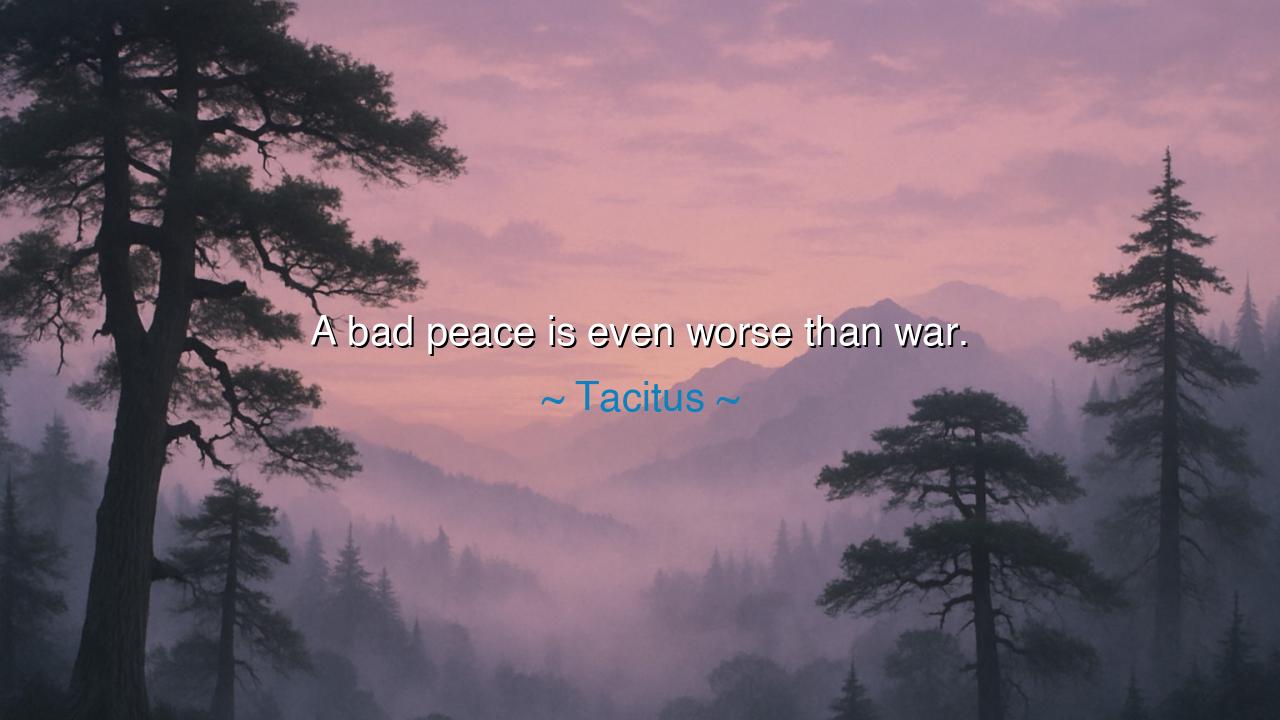
A bad peace is even worse than war.






The Roman historian Tacitus, whose pen cut with the sharpness of a sword, once declared with grave solemnity: “A bad peace is even worse than war.” At first, these words may seem paradoxical, for is not peace always the higher good, the long-sought goal of all peoples? Yet Tacitus, steeped in the brutal politics of empire and the shifting sands of Roman power, knew that not all peace is just. A peace that is rotten at its core, that cloaks oppression in the guise of harmony, is but a slower, more insidious destruction than open conflict.
The origin of this truth lies in Rome itself. Tacitus lived in an age when emperors proclaimed peace across the empire even as they crushed dissent, enslaved nations, and silenced voices with cruelty. Rome’s “Pax Romana” was lauded as a golden era, yet beneath its gleaming façade, entire peoples were stripped of freedom, taxed into ruin, and kept obedient through fear. Such a peace was not truly peace—it was submission masquerading as stability. Tacitus, in his wisdom, recognized that such false harmony corrodes the soul more than the open wounds of war.
History offers grim confirmation of this insight. After the Treaty of Versailles ended the First World War, the world rejoiced at the coming of peace. Yet it was a bad peace, filled with bitterness, humiliation, and injustice imposed upon the defeated. That poisoned treaty sowed the seeds of resentment and despair in Germany, leading not to lasting stability but to the rise of tyranny and the horrors of the Second World War. The lesson is clear: a peace built on vengeance, inequality, or dishonor is not peace at all—it is merely the prelude to an even greater catastrophe.
We see too in the struggles for freedom across the world that false peace is a chain heavier than open conflict. Colonial powers often offered their subjects “peace” in exchange for obedience, yet this was a peace of silence, bought with the suppression of voices. It was the courage of leaders like Nelson Mandela, who rejected a false reconciliation that ignored justice, that showed the truth of Tacitus’s warning. Better to endure the storm of struggle than to live under a peace of oppression, where the heart of a people rots in despair.
The wisdom of Tacitus also speaks to the individual soul. There are times in life when one is tempted to accept a false peace: to remain silent in the face of injustice, to tolerate dishonor for the sake of comfort, to avoid conflict though truth cries out. Such a peace may bring temporary quiet, but in time it poisons the spirit. It is better to face the storm of confrontation, to endure the struggle for what is right, than to wear the chains of a bad peace that corrupts the soul.
This lesson is deeply practical: when we seek peace, we must seek a just peace, not merely the absence of conflict. Whether in nations or in families, in politics or in friendships, we must ask: is this peace built upon truth, fairness, and dignity—or upon fear, silence, and compromise of principle? If it is the latter, then it is no true peace, but a hidden war waiting to erupt. To maintain honor and integrity, one must sometimes endure the harder road of struggle, for it is through justice alone that peace gains its strength.
Thus Tacitus’s words ring through the centuries as both warning and call: “A bad peace is even worse than war.” Let them remind us that true peace is not the stillness of submission, but the harmony of justice. Let us not be lulled by quiet that hides oppression, nor seduced by treaties that mask injustice. Instead, let us labor always for a peace that is righteous, even if it comes at great cost. For only such peace endures, and only such peace brings life instead of decay.






AAdministratorAdministrator
Welcome, honored guests. Please leave a comment, we will respond soon